 Technology peripherals
Technology peripherals
 AI
AI
 OpenAI professionally poached nearly 100 bosses! Major companies such as Google and Meta have become 'reserve talent pools'
OpenAI professionally poached nearly 100 bosses! Major companies such as Google and Meta have become 'reserve talent pools'
OpenAI professionally poached nearly 100 bosses! Major companies such as Google and Meta have become 'reserve talent pools'
ChatGPT became an instant hit, completely breaking openAI, a startup company. In just 5 days, the number of registered users worldwide exceeded 1 million, and its popularity remains unabated to this day.
But why did OpenAI make ChatGPT? What are the backgrounds of OpenAI’s employees?
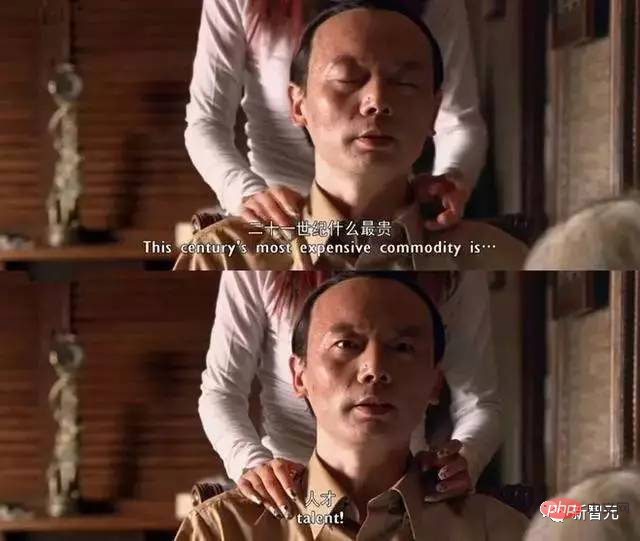
In the battle to grab people, openAI wins
According to the foreign media Leadgenious Punks & Pinstripes’ analysis of the backgrounds of the current 736 OpenAI employees, it can be found: Almost all of OpenAI's core talent comes from large technology companies.
Among them, 59 people previously worked at Google, followed by Meta (34 people), Apple (15 people), Dropbox (14 people), and Amazon (11 people).
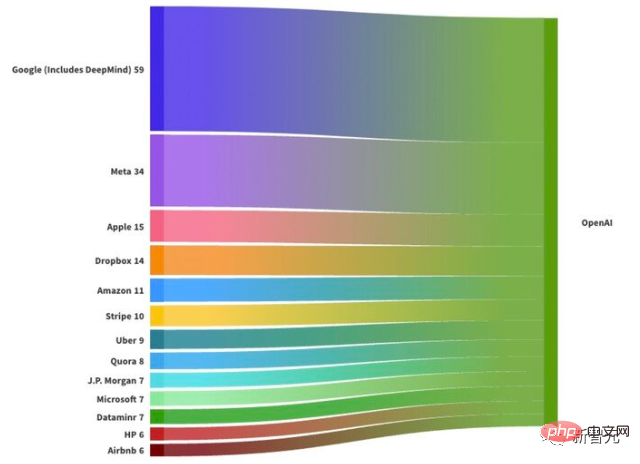
Among OpenAI’s employees, 389 have worked at hardware or software companies; 39 are from the financial services industry, including JPMorgan Chase (7 foreign employees) , Robin Hood (5 people) and UBS (3 people).
OpenAI has already won the battle for technical talents.
LeadGenius’ research results also sound a “talent alarm” for large technology companies. Those large technology companies, especially Google, do not pay enough attention to their employees.
Many of those who have resigned from Google are developing secondary products in innovation laboratories (such as Alphabet X), which means that they basically cannot see the impact of their work on the company. have a meaningful impact on your core product or revenue.
And openAI can give them this opportunity.
In addition, OpenAI has recruited 39 financial employees, far exceeding industry expectations. Does it mean that OpenAI’s next move is to “challenge the financial services industry”?
Lisa Wardlaw, president and founder of 360 Digital Immersion, said, "It's too early to tell, but they do provide a viable option for Wall Street talents looking for new options."
In the era when Mark Zuckerberg founded Facebook, you only needed a college dormitory or a garage to start a world-class company; and OpenAI's success was "poaching" from large companies.
Google: OpenAI’s reserve talent pool
As early as last November, in the blog post published by ChatGPT, the names of five Google employees can be found in the acknowledgments section: Barret Zoph, Liam Fedus, Luke Metz , Jacob Menick, Rapha Gontijo Lope
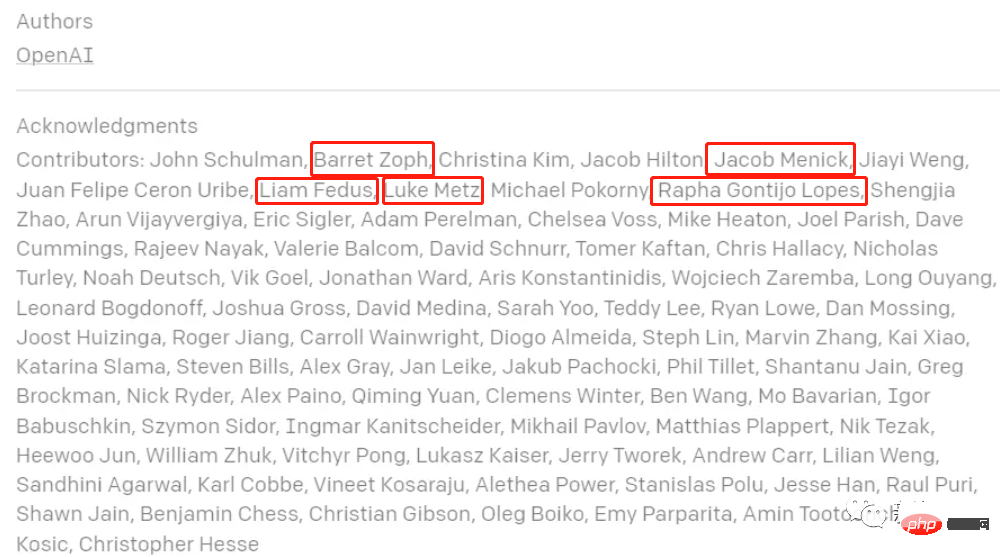
LinkedIn shows that Barret Zoph left Google Brain in August 2022 and joined OpenAI to participate in the creation of ChatGPT. His main research direction is training large sparse Language models and AuoML, such as Neural Architecture Search (NAS).

Liam Fedus joined Google Brain in 2018 and OpenAI around September 2022. During his doctoral studies at the University of Montreal, his mentor was Turing Award winner Yoshua Bengio. His research direction was horizontal. Across supervised, unsupervised and reinforcement learning.

Luke Metz joined Google Brain in 2016 as a senior research scientist. Currently, his LinkedIn and Twitter profiles do not show that he has joined OpenAI.
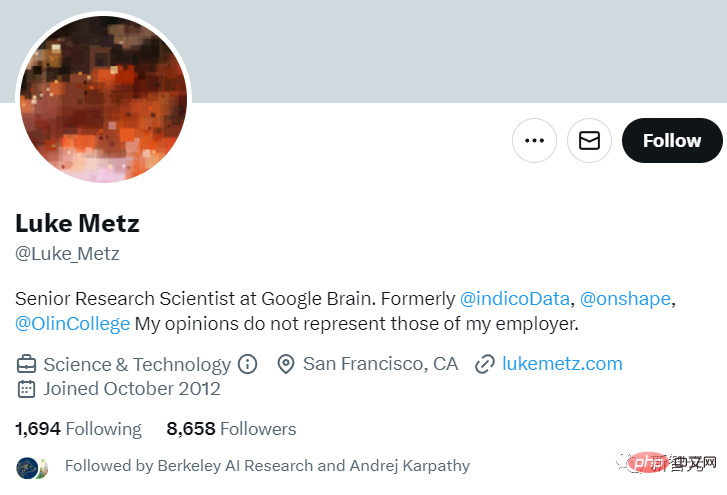
Jacob Menick joined DeepMind in September 2015 and OpenAI as a researcher in September 2022. He graduated with a Ph.D. from University College London. His main research directions are machine learning, generative patterns, large-scale deep learning, and variation. Reasoning, information theory, and sparse models.

Rapha Gontijo Lope graduated from the Georgia Institute of Technology in June 2018, and then joined Google Brain, during which he participated in the two-year Google AI residency program in 2022 Joined OpenAI in September

But the biggest boss is Ilya Sutskever, the co-founder and chief scientist of OpenAI. He graduated from the University of Toronto in 2005 and received a PhD in computer science in 2012. Bachelor of Science.
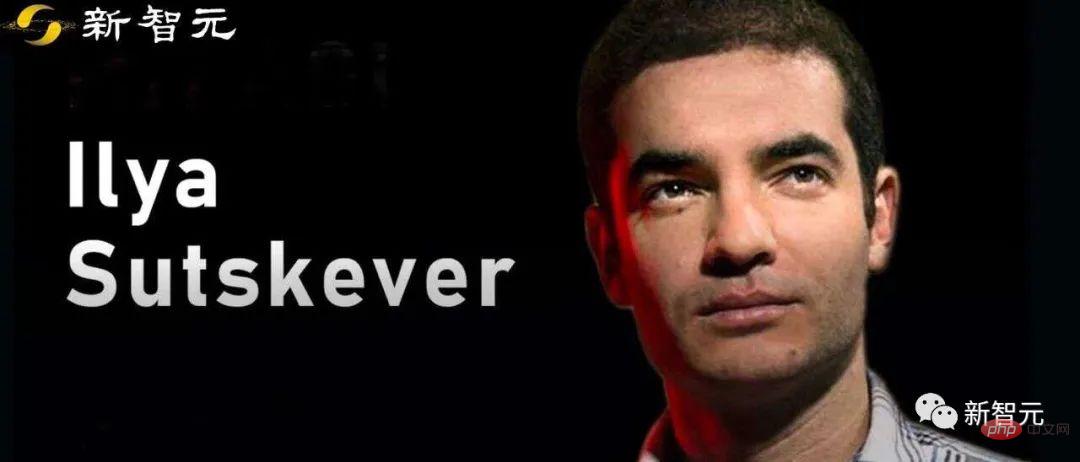
Since graduation, he has worked at Stanford University, DNNResearch, and Google Brain, engaged in research related to machine learning and deep learning. In 2015, he gave up his high-paying position at Google to work with Greg Brockman and others jointly founded OpenAI, where they led the development of GPT-1, 2, 3 and DALLE series models.
Google is still too afraid of risks
Most of the employees mentioned above have worked at Google Brain. Some employees said in interviews that the work culture of Google Brain is really disappointing. In addition to the uncomfortable bureaucracy and overly cautious approach to new product proposals, many employees thought about leaving.
In addition, some employees complained that they once suggested that the company should add a conversation function to the search engine, but no one paid attention to it at all.
However, Google Brain is still full of talents, and there are still more than 800 top scientists from all over the world.
In addition, AppSheet founder Praveen Seshadri also published a blog after leaving Google. He believed that Google was trapped in a maze, and employees wasted a lot of energy on approvals, startup processes, and legal matters. There is very little that can actually be done about evaluations, performance reviews, execution reviews, documentation, meetings, bug reports, triage, OKRs, H1 plans, subsequent H2 plans, all-hands summits, and reorganizations.

Especially in the face of the encirclement and suppression of OpenAI and Microsoft, Google not only faces technical pressure, but also faces major layoffs and other issues, which to some extent reflects the management and employees There is a general lack of self-awareness.
The biggest problem still lies in Google’s core culture:
- No mission (no mission)
- No sense of urgency (no urgency)
- delusionsofexceptionalism
- mismanagement
Although Google's two core values are "respect for users" and "respect for opportunities", in practice , these systems and processes are intentionally designed to "respect risk."
Risk mitigation trumps everything, and if everything goes well, the most important thing is to avoid problems and move forward with growing ad revenue:
- Changed Every line of code is risky, so a lot of intermediate processes are needed to ensure that every code change is perfectly risk-free; anything released is risky, so there is a lot of review and approval , even just releasing a small change on a small product;
- Any decision that is not obvious is a risk and needs to be decided jointly by the group;
- Any way of doing things that is different from the past is a risk , so stick to your original ways;
- Any employee who is dissatisfied with you is a career risk, so managers aim for 100% employee satisfaction and treat even the worst-performing employees with caution;
- Any disagreement with the management chain is a career risk, so be sure to comply with your superiors;
- If the focus shifts to value creation, everything will become different, such as Ask yourself every day, "Who did I create value for today?" If you can create more value and have a greater impact, employees will work harder.
In the early years, Google frantically poached corners of major companies such as Meta to expand its own talent resources in the "war for talent". Now it has become OpenAI's reserve talent pool.
No wonder Google sounded a "red alert" after ChatGPT became popular. If it doesn't pay attention to the protection of talents, sooner or later all the senior researchers it has trained will be poached!
Reference materials:
https://www.php.cn/link/2287c6b8641dd2d21ab050eb9ff795f3The above is the detailed content of OpenAI professionally poached nearly 100 bosses! Major companies such as Google and Meta have become 'reserve talent pools'. For more information, please follow other related articles on the PHP Chinese website!

Hot AI Tools

Undresser.AI Undress
AI-powered app for creating realistic nude photos

AI Clothes Remover
Online AI tool for removing clothes from photos.

Undress AI Tool
Undress images for free

Clothoff.io
AI clothes remover

Video Face Swap
Swap faces in any video effortlessly with our completely free AI face swap tool!

Hot Article

Hot Tools

Notepad++7.3.1
Easy-to-use and free code editor

SublimeText3 Chinese version
Chinese version, very easy to use

Zend Studio 13.0.1
Powerful PHP integrated development environment

Dreamweaver CS6
Visual web development tools

SublimeText3 Mac version
God-level code editing software (SublimeText3)

Hot Topics
 ChatGPT now allows free users to generate images by using DALL-E 3 with a daily limit
Aug 09, 2024 pm 09:37 PM
ChatGPT now allows free users to generate images by using DALL-E 3 with a daily limit
Aug 09, 2024 pm 09:37 PM
DALL-E 3 was officially introduced in September of 2023 as a vastly improved model than its predecessor. It is considered one of the best AI image generators to date, capable of creating images with intricate detail. However, at launch, it was exclus
 A new programming paradigm, when Spring Boot meets OpenAI
Feb 01, 2024 pm 09:18 PM
A new programming paradigm, when Spring Boot meets OpenAI
Feb 01, 2024 pm 09:18 PM
In 2023, AI technology has become a hot topic and has a huge impact on various industries, especially in the programming field. People are increasingly aware of the importance of AI technology, and the Spring community is no exception. With the continuous advancement of GenAI (General Artificial Intelligence) technology, it has become crucial and urgent to simplify the creation of applications with AI functions. Against this background, "SpringAI" emerged, aiming to simplify the process of developing AI functional applications, making it simple and intuitive and avoiding unnecessary complexity. Through "SpringAI", developers can more easily build applications with AI functions, making them easier to use and operate.
 Choosing the embedding model that best fits your data: A comparison test of OpenAI and open source multi-language embeddings
Feb 26, 2024 pm 06:10 PM
Choosing the embedding model that best fits your data: A comparison test of OpenAI and open source multi-language embeddings
Feb 26, 2024 pm 06:10 PM
OpenAI recently announced the launch of their latest generation embedding model embeddingv3, which they claim is the most performant embedding model with higher multi-language performance. This batch of models is divided into two types: the smaller text-embeddings-3-small and the more powerful and larger text-embeddings-3-large. Little information is disclosed about how these models are designed and trained, and the models are only accessible through paid APIs. So there have been many open source embedding models. But how do these open source models compare with the OpenAI closed source model? This article will empirically compare the performance of these new models with open source models. We plan to create a data
 How to install chatgpt on mobile phone
Mar 05, 2024 pm 02:31 PM
How to install chatgpt on mobile phone
Mar 05, 2024 pm 02:31 PM
Installation steps: 1. Download the ChatGTP software from the ChatGTP official website or mobile store; 2. After opening it, in the settings interface, select the language as Chinese; 3. In the game interface, select human-machine game and set the Chinese spectrum; 4 . After starting, enter commands in the chat window to interact with the software.
 Posthumous work of the OpenAI Super Alignment Team: Two large models play a game, and the output becomes more understandable
Jul 19, 2024 am 01:29 AM
Posthumous work of the OpenAI Super Alignment Team: Two large models play a game, and the output becomes more understandable
Jul 19, 2024 am 01:29 AM
If the answer given by the AI model is incomprehensible at all, would you dare to use it? As machine learning systems are used in more important areas, it becomes increasingly important to demonstrate why we can trust their output, and when not to trust them. One possible way to gain trust in the output of a complex system is to require the system to produce an interpretation of its output that is readable to a human or another trusted system, that is, fully understandable to the point that any possible errors can be found. For example, to build trust in the judicial system, we require courts to provide clear and readable written opinions that explain and support their decisions. For large language models, we can also adopt a similar approach. However, when taking this approach, ensure that the language model generates
 Rust-based Zed editor has been open sourced, with built-in support for OpenAI and GitHub Copilot
Feb 01, 2024 pm 02:51 PM
Rust-based Zed editor has been open sourced, with built-in support for OpenAI and GitHub Copilot
Feb 01, 2024 pm 02:51 PM
Author丨Compiled by TimAnderson丨Produced by Noah|51CTO Technology Stack (WeChat ID: blog51cto) The Zed editor project is still in the pre-release stage and has been open sourced under AGPL, GPL and Apache licenses. The editor features high performance and multiple AI-assisted options, but is currently only available on the Mac platform. Nathan Sobo explained in a post that in the Zed project's code base on GitHub, the editor part is licensed under the GPL, the server-side components are licensed under the AGPL, and the GPUI (GPU Accelerated User) The interface) part adopts the Apache2.0 license. GPUI is a product developed by the Zed team
 Don't wait for OpenAI, wait for Open-Sora to be fully open source
Mar 18, 2024 pm 08:40 PM
Don't wait for OpenAI, wait for Open-Sora to be fully open source
Mar 18, 2024 pm 08:40 PM
Not long ago, OpenAISora quickly became popular with its amazing video generation effects. It stood out among the crowd of literary video models and became the focus of global attention. Following the launch of the Sora training inference reproduction process with a 46% cost reduction 2 weeks ago, the Colossal-AI team has fully open sourced the world's first Sora-like architecture video generation model "Open-Sora1.0", covering the entire training process, including data processing, all training details and model weights, and join hands with global AI enthusiasts to promote a new era of video creation. For a sneak peek, let’s take a look at a video of a bustling city generated by the “Open-Sora1.0” model released by the Colossal-AI team. Open-Sora1.0
 The local running performance of the Embedding service exceeds that of OpenAI Text-Embedding-Ada-002, which is so convenient!
Apr 15, 2024 am 09:01 AM
The local running performance of the Embedding service exceeds that of OpenAI Text-Embedding-Ada-002, which is so convenient!
Apr 15, 2024 am 09:01 AM
Ollama is a super practical tool that allows you to easily run open source models such as Llama2, Mistral, and Gemma locally. In this article, I will introduce how to use Ollama to vectorize text. If you have not installed Ollama locally, you can read this article. In this article we will use the nomic-embed-text[2] model. It is a text encoder that outperforms OpenAI text-embedding-ada-002 and text-embedding-3-small on short context and long context tasks. Start the nomic-embed-text service when you have successfully installed o





